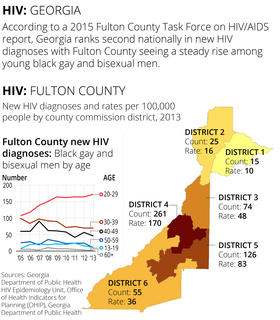Fulton County Unveils New Strategy To End AIDS
While much of the country has seen a decrease in HIV diagnoses, Fulton County says it has become “one of the epicenters” of the HIV epidemic in the U.S.
On Tuesday, World AIDS Day, the Fulton County Task Force on HIV/AIDS announced the county’s new strategy to end AIDS that includes greater access to free syringes and condoms, more testing in more places and faster access to treatment.
Routine Testing
The county says it wants to increase HIV and sexually transmitted disease screening at high schools and universities in Fulton County. It also seeks to make it a routine “opt-out” test offered at hospitals, outpatient clinics and jails in the county.
According to state law, parental consent is not required for minors if they agree to be tested for an STD, including HIV.
Increasing Access
Georgia ranks second among U.S. states in the rate of new HIV diagnoses, while Atlanta is fifth among metropolitan areas, with a steady rise in new diagnoses among young black gay and bisexual men in the last decade.
In 2013, only 65 transgender persons reported living with HIV in the Atlanta metro area. The county says the true number is unknown and it hopes to have better data collection and more targeted testing of the most vulnerable populations.
Free Syringe Exchange
Fulton County says heroin use in the Atlanta area is low compared to other cities, but a 2013 study found an increase in heroin and methamphetamine use. These users are at high risk of HIV infection when they share contaminated needles.
The task force report states, “This is not surprising as Georgia is both a final destination point for drug shipments and a smuggling corridor for drugs transported along the east coast.”
The report said one objective was to increase access to safe, free and confidential syringe exchanges as well as substance abuse treatment and to seek funding for these programs.
Condom Distribution
The county says it’s also been increasing the number of condoms distributed by about 10 percent per year since 2012 and the target for 2016 is just below 2.5 million condoms.
About 30 percent of condoms distributed would be for HIV-infected individuals, including those who are in Fulton County jails.

San Francisco
The county said it is taking a close look at San Francisco’s “Getting to Zero” model for accelerating access to care for newly-diagnosed HIV patients.
In San Francisco, the city is working aggressively to connect people to care the same day they are diagnosed. Fulton County’s goal is to connect patients to care within three days and to get them to continue seeing their doctors.
In Fulton County, according to the report, racial minorities, women, adolescents, drug users and the uninsured were most likely to discontinue treatment.
The task force said it wants to expand Medicaid and use of telemedicine as well as look for greater funding for the Housing and Urban Development’s Housing Opportunities for Persons with AIDS (HOPWA) program to increase retention of care.
Financial Accounting
In the report, the county admits that from 2012 to 2014, the Fulton County Department of Health and Wellness “was a very poor steward of federal HIV prevention monies awarded to it by CDC.”
In 2012, it spent just 28 percent of the money it was given, leaving $3.6 million unspent.
The report states: “There are multiple reasons for this missed opportunity, including bureaucratic issues around hiring staff, awarding contracts, and the county’s rules around the Request for Proposals (RFP) mechanism of procuring services … lack of effective and responsive leadership, however, was a key issue behind the failure, including at the level of the Health Director. The impact of this failure of leadership goes beyond the HIV program. For example a TB outbreak in the County’s homeless shelters raged out of control, including the emergence of a drug resistant strain, due in part to an ineffective response by FCDHW.”
The task force notes that in January 2015, new leadership took over the HIV prevention program.
The Fulton County Task Force on HIV/AIDS, which was formed in December 2014, said this report is just the first phase, with draft objectives that will guide the development of its Action Plans. (Read the full report here.)
The Action Plans will outline the full strategy, metrics and targets. It’s set to be released on National HIV Testing Day on June 27, 2016.
9(MDAxODM0MDY4MDEyMTY4NDA3MzI3YjkzMw004))








